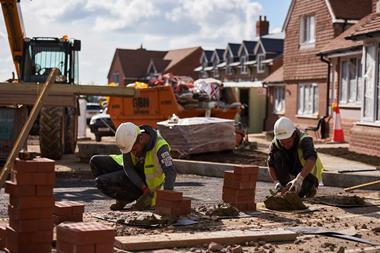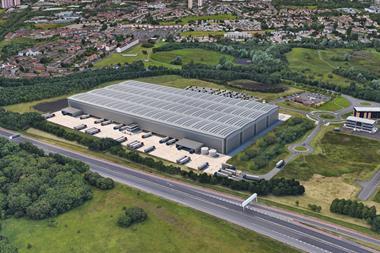Labour’s shadow chancellor Rachel Reeves has pledged to overhaul the “antiquated” planning system and fast track planning applications for major infrastructure projects in Labour’s pitch to “get Britain building again”.

In her speech to the Labour Party conference in Liverpool today (9 October), Reeves said a Labour overhaul of planning rules would fast track major planning applications for battery factories, life sciences and 5G infrastructure.
The announcements follow the Conservative Party conference on Manchester last week, at which housing secretary Michael Gove said the Renters Reform Bill was not delayed, as had been rumoured, and prime minister Rishi Sunak announced the cancellation of the northern leg of HS2.
On Monday, the shadow chancellor accused the Conservatives of blocking development and investment, and told delegates Labour would tackle “head-on the obstacles presented by our antiquated planning system”.
As part of plans to create more jobs and unlock investment from business, she said Labour would speed up investment in planning by hiring 300 more planning officers to accelerate decision making.
Reeves called the party’s infrastructure plans a “once in a generation set of reforms to accelerate the building of critical infrastructure for energy, transport, and technology”.
She accused the government of convincing voters that “we can’t build anything any more”, also criticising the impact of the “wreckage of Tory misrule” on the UK’s economic credibility.
“If Tories won’t build, if the Tories can’t build, then we will,” Reeves said, adding that the “single biggest obstacle to building infrastructure, to investment and to growth in this country, is the Conservative Party itself”.
Reeves said Labour would also look to increase the stamp duty surcharge for people from overseas buying property, with the revenue generated used to fund housebuilding.
On delivering infrastructure projects in the current economic backdrop, Reeves said Labour would “not play fast and loose with public finances”.
She said “tough decisions” would be needed, but added that Labour would put forward a new charter for budget responsibility, making significant spending decisions subject to independent forecasts.
Industry figures broadly welcomed Reeves’ announcements.
Industry reactions to the shadow chancellor’s plans:
Melanie Leech, chief executive of the British Property Federation: “Creating a better resourced, more effective and efficient planning system is now high on the political agenda for all parties. It is good to see the Labour Party prioritising strategic planning for large projects. Strategic projects, including those that deliver the essential industrial and logistics services we rely on, often fall across the boundaries of multiple local authorities, and therefore don’t get prioritised. Identifying such opportunities, and allowing them to be driven at regional level, is a positive route to the more homes and growth the country needs.
”Planning resource have been hollowed out over the past decade, as planning has faced some of the most severe local authorities cuts. Communities are also losing out on proactive planning, and staff are demoralised. The proposed 300 new planning officers is a very positive start to addressing the backlog, and more will be needed.”
Alistair Watson, UK head of planning and environment at law firm Taylor Wessing, said: “Many of us in the real estate, infrastructure and energy sectors will welcome both the vision and the intent on the delivery of planning reform. That intention is extremely important; there have been three attempts at planning reform since 2019, and there has been no real progress. Progress - amongst many things - is what the country and the sector desperately needs.
“It’s true that there is a need to speed up the planning for critically important infrastructure. Though it’s also important to remember that the entire planning system needs reform. Permitted Development Rights to allow swift delivery of EV charging points; any rise in planning application fees to be used for investment only in local planning teams; and social and market housing to enable growth across the country are just three examples. All of this is critical, and all of this is the basic infrastructure which is critical to economic, social, and environmental sustainable development in the UK.”
Mark White, managing director for premium housebuilder Bargate Homes: “We welcome Rachel Reeves indication that a Labour government would look to review the rules surrounding building on greenbelt land. Not all greenbelt is beautifully managed and an asset to the community. Meanwhile, there are some rural schools at threat of closure because of lack of pupil numbers.
“We also welcome Labour’s enthusiasm to improve the planning system and the pledge to deliver 1.5 million homes during a five-year parliamentary term. The government and entire industry has totally lost pace with the 300,000 new homes per annum target over the past few years. Planning in rural areas is near impossible, and the system we are working with penalises small and medium-sized enterprises far more than the PLCs.”
































No comments yet